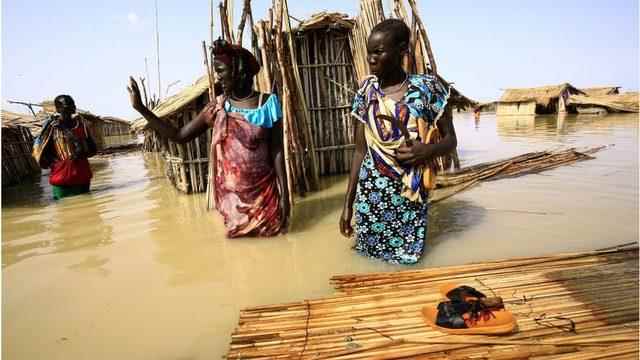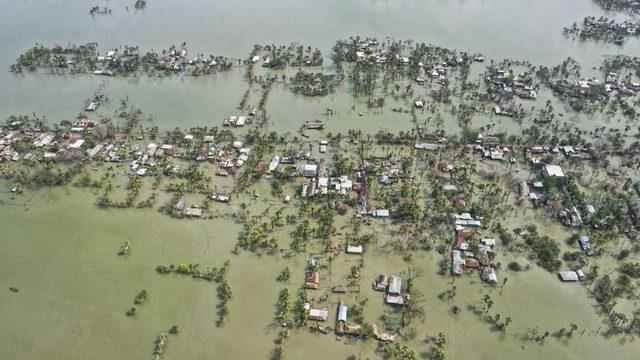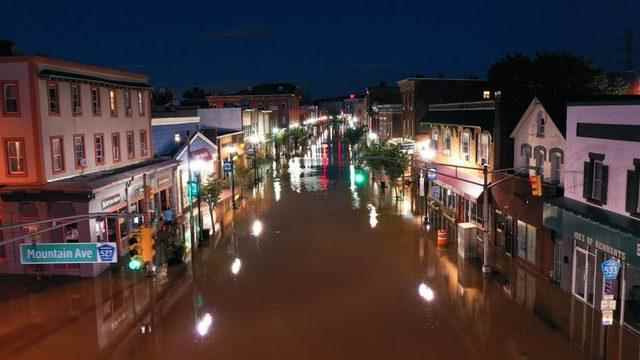Charity organization Christian Aid has released its report on climate change-related disasters in 2021. According to the report, 10 disasters, each causing more than $1.5 billion in damage, have plunged millions of people into misery around the world.
Among the events listed in the report, Hurricane Ida, which hit the USA in August, and the floods in Europe in July, had the heaviest financial balance.
In many poorer areas, floods and storms have led to massive displacement and victimization of people.
According to Christian Aid, Ida was the most financially devastating disaster of the year.
Thousands of people living on the slow-moving hurricane’s route through Louisiana were evacuated.
The storm caused massive rainfall in many states and cities. New York has issued an emergency flood warning for the first time. About 95 people died. Economic losses are estimated to be around 65 billion dollars.
The second most costly event financially was the floods in Germany, France and other European countries in July.
The speed and density of the water overcame the barricades, causing 240 deaths. The total loss was around $43 billion, according to the report.
Most of the disasters included in the study occurred in developed countries.
This is because insurance claims are more convenient for estimating financial losses. This is usually possible in developed countries. People in these countries have a higher chance of getting home or business insurance.
According to insurance company Aon, 2021 will be the fourth year in the past 5 years that worldwide costs of natural disasters exceed $100 billion.
The report also documents many other incidents where the impact on people was evident, although the financial impact was more difficult to detect.

Flooding in South Sudan displaced more than 800,000 people, with 200,000 displaced by Cyclone Tauktae, which hit India, Sri Lanka and the Maldives in May.
Author of Christian Aid’s report, Dr. “It’s a huge human impact,” said Kat Kramer.
“Frankly, it’s incredibly difficult to lose your house, your livelihood and everything and not have the resources to rebuild it. But at least if you have insurance, you have a mechanism to rebuild it.”
Not every extreme weather event can be attributed to climate change, but scientists are now bolder in their discovery.
At Oxford University, one of the leading researchers in the field of climate change, Dr. Friederike Otto, in a post on Twitter earlier this year, stated that every heat wave occurring in the world right now is made more likely and more intense by human-induced climate change.
With regard to storms and hurricanes, the evidence continues to grow that climate change is also affecting these events.
In August, the Intergovernmental Panel on Climate Change (IPCC) published the first part of its sixth assessment report.
The report’s authors said the credible evidence for human influence in the making of hurricanes and tropical cyclones is even stronger.
The study said that the proportion of intense tropical cyclones, average peak tropical cyclone wind speeds, and peak wind speeds of the most intense tropical cyclones will increase on a global scale with increasing global warming.
Just weeks after this report was released, Hurricane Ida struck the United States.

The report highlights the need for more effort today in reducing carbon emissions to mitigate the effects of extreme weather events. It also calls for assistance to poorer countries suffering losses.
At the COP26 Climate Summit in Glasgow, the issue of financing the loss and damage caused by climate-related events caused a great deal of disagreement between countries.
While developing countries demanded that this aid be made in cash, richer countries argued that more discussion was needed on this issue.
Christian Aid’s Climate Justice Adviser in Bangladesh, Nushrat Chowdhury, said: “While it’s good to see the issue of loss and damage become a major issue at COP26, leaving the conference without an established fund to truly help people permanently damaged by climate change It was disappointing,” he said, adding:
“Launching this fund should be a global priority in 2022.”
To the full report from here you can reach

Charity organization Christian Aid has released its report on climate change-related disasters in 2021. According to the report, 10 disasters, each causing more than $1.5 billion in damage, have plunged millions of people into misery around the world.
Among the events listed in the report, Hurricane Ida, which hit the USA in August, and the floods in Europe in July, had the heaviest financial balance.
In many poorer areas, floods and storms have led to massive displacement and victimization of people.
According to Christian Aid, Ida was the most financially devastating disaster of the year.
Thousands of people living on the slow-moving hurricane’s route through Louisiana were evacuated.

The storm caused massive rainfall in many states and cities. New York has issued an emergency flood warning for the first time. About 95 people died. Economic losses are estimated to be around 65 billion dollars.
The second most costly event financially was the floods in Germany, France and other European countries in July.
The speed and density of the water overcame the barricades, causing 240 deaths. The total loss was around $43 billion, according to the report.
Most of the disasters included in the study occurred in developed countries.
This is because insurance claims are more convenient for estimating financial losses. This is usually possible in developed countries. People in these countries have a higher chance of getting home or business insurance.
According to insurance company Aon, 2021 will be the fourth year in the past 5 years that worldwide costs of natural disasters exceed $100 billion.
The report also documents many other incidents where the impact on people was evident, although the financial impact was more difficult to detect.

Flooding in South Sudan displaced more than 800,000 people, with 200,000 displaced by Cyclone Tauktae, which hit India, Sri Lanka and the Maldives in May.
Author of Christian Aid’s report, Dr. “It’s a huge human impact,” said Kat Kramer.
“Frankly, it’s incredibly difficult to lose your house, your livelihood and everything and not have the resources to rebuild it. But at least if you have insurance, you have a mechanism to rebuild it.”
Not every extreme weather event can be attributed to climate change, but scientists are now bolder in their discovery.
At Oxford University, one of the leading researchers in the field of climate change, Dr. Friederike Otto, in a post on Twitter earlier this year, stated that every heat wave occurring in the world right now is made more likely and more intense by human-induced climate change.
With regard to storms and hurricanes, the evidence continues to grow that climate change is also affecting these events.
In August, the Intergovernmental Panel on Climate Change (IPCC) published the first part of its sixth assessment report.
The report’s authors said the credible evidence for human influence in the making of hurricanes and tropical cyclones is even stronger.
The study said that the proportion of intense tropical cyclones, average peak tropical cyclone wind speeds, and peak wind speeds of the most intense tropical cyclones will increase on a global scale with increasing global warming.
Just weeks after this report was released, Hurricane Ida struck the United States.

At the COP26 Climate Summit in Glasgow, the issue of financing the loss and damage caused by climate-related events caused a great deal of disagreement between countries.
While developing countries demanded that this aid be made in cash, richer countries argued that more discussion was needed on this issue.
Christian Aid’s Climate Justice Adviser in Bangladesh, Nushrat Chowdhury, said: “While it’s good to see the issue of loss and damage become a major issue at COP26, leaving the conference without an established fund to truly help people permanently damaged by climate change It was disappointing,” he said, adding:
“Launching this fund should be a global priority in 2022.”
To the full report from here you can reach